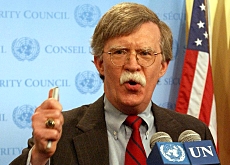Swiss hold out hope for UN human rights body

Foreign Minister Micheline Calmy-Rey is convinced the United States can still be persuaded to back plans for a Human Rights Council at the United Nations.
Her comments on Friday in Geneva follow Washington’s announcement earlier this week that it would vote against the latest draft for the body, claiming it is seriously flawed.
Calmy-Rey, who admitted in a speech on Thursday that the US and Switzerland did not see eye-to-eye on human rights, reiterated that the proposed council was the result of compromise and was not an ideal solution.
But she said the new body represented a big improvement on the Human Rights Commission, which it would replace. The commission has been widely criticised for allowing some of the worst offending countries to avoid condemnation.
She said that if negotiations on the current draft were reopened there was a real risk that the council would never see the light of day.
“We think there is still room for persuasion and that the project will be adopted in the next few days,” Calmy-Rey told swissinfo.
She pointed out that the Swiss, who came up with the initial blueprint for the council, had also had to make compromises.
The Swiss foreign minister said that if a solution was not found shortly, the 62nd session of the Human Rights Commission would start in Geneva as planned on March 13.
“Unacceptable”
On Monday John Bolton, US ambassador to the UN, described the draft resolution as unacceptable and said he would vote against the text if it was put before the General Assembly.
He wants to reopen negotiations on the text and ensure tougher mechanisms for keeping countries with poor human rights records off the council, which would be based in Geneva.
UN Secretary-General Kofi Annan voiced his frustration on Thursday at the US position, warning that the whole project – a key element of his reform programme – was in danger of “unravelling”.
“It is important that the decision be taken as soon as possible. And I think the member states should find a way of bringing this issue to closure,” said the UN secretary-general.
Compromise text
On Wednesday the European Union said it could accept the text “as a compromise”, saying it met the basic requirements for the establishment of a Human Rights Council.
But Britain said US opposition had to be taken into consideration before the draft resolution was adopted.
Calmy-Rey agreed that US reservations had to be taken seriously in view of the country’s position within the UN.
“The future council cannot come into being if it is opposed by such an important actor as the United States,” said Calmy-Rey.
According to the text, the current 53-member commission would be replaced by a 47-member council that would be elected by an absolute majority of the 191-member General Assembly.
The new body would meet three times a year for a total of ten weeks, with the possibility of holding emergency sessions. Members found guilty of gross human rights violations could be kicked off the council.
swissinfo, Adam Beaumont and Frédéric Burnand in Geneva
Discussions on the new rights body have been continuing since early last year. The UN hopes to have a final resolution in place by March 13 when the Human Rights Commission is set to start its annual session in Geneva.
Amnesty International and Human Rights Watch have urged countries to adopt the text, which they say is not perfect but the best possible compromise.
According to the draft, members of the council would have to “uphold the highest standards in the promotion and protection of human rights” and have their rights record reviewed during their three-year term. Members could be suspended for “gross and systematic” rights violations.
The Human Rights Commission was established in Geneva in 1946 and comprises representatives of 53 countries nominated by regional groupings.
Foreign Minister Micheline Calmy-Rey launched the idea for a Human Rights Council in March 2004.
The basis for the new body stems from models drawn up by Swiss human rights expert Walter Kälin.

In compliance with the JTI standards
More: SWI swissinfo.ch certified by the Journalism Trust Initiative












You can find an overview of ongoing debates with our journalists here . Please join us!
If you want to start a conversation about a topic raised in this article or want to report factual errors, email us at english@swissinfo.ch.